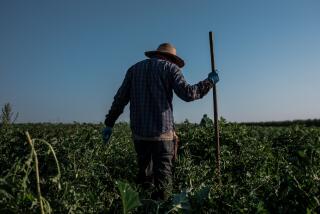Judge Rules Black Farmers Can Pursue Bias Case Against Government
WASHINGTON — A federal judge ruled Friday that black farmers can pursue their highly publicized discrimination case against the Agriculture Department as a class action.
The ruling by U.S. District Judge Paul L. Friedman means that the farmers can sue the government as a large group rather than pursuing cases individually. Despite protests from the Justice Department, which contended that there were too many issues to be tried at one time, Friedman found that the farmers’ cases were unified by their claims concerning a pattern of discrimination.
More than 400 black farmers from 15 states filed the lawsuit here, saying they were treated unfairly by agriculture officials. First, according to the suit, the USDA denied or delayed their bids for government farm loans because of their race. Then, the suit contends, the USDA failed to investigate or unfairly rejected their written complaints of discrimination.
“We knew all along we were a class,” said Timothy C. Pigford, one of the leading plaintiffs in the case, who claims he was forced off his North Carolina farm in 1984 because of discrimination. “What we hope now is that the government will do the right thing and go ahead and compensate these families . . . so that they can go back to farming. Why don’t they settle this suit with dignity to the farmers so we can get on with our lives?”
Alexander J. Pires Jr., a lawyer representing the farmers, called the ruling a “huge victory” and said thousands of people now will be covered. He said billions of dollars are at stake in the lawsuit.
The farmers have drawn support from the National Assn. for the Advancement of Colored People and other organizations. Although Agriculture Secretary Dan Glickman has vowed to compensate farmers who can prove they were discriminated against, critics contend that officials are moving too slowly.
The lawsuit alleges that black farmers nationwide suffered economic harm after the USDA’s civil rights enforcement office was disbanded in 1983 during the Reagan administration. As a result, discrimination complaints were rejected or kept pending without proper investigation, the lawsuit contends. It wasn’t until 1997 that USDA officials set up a new office and began addressing the backlog after internal studies found there were serious problems.
Tom Amontree, a USDA spokesman, issued a statement saying Glickman “has said all along he wants to resolve this painful issue as quickly as possible.”
Blacks make up less than 1% of the nation’s 1.9 million farmers, and their ranks have been dwindling rapidly.
Friedman ruled that the case will be broadened to include all African Americans who farmed from 1983 to 1997, sought help from a federal farm program and ultimately filed a written complaint alleging discrimination.
More to Read
Sign up for Essential California
The most important California stories and recommendations in your inbox every morning.
You may occasionally receive promotional content from the Los Angeles Times.










